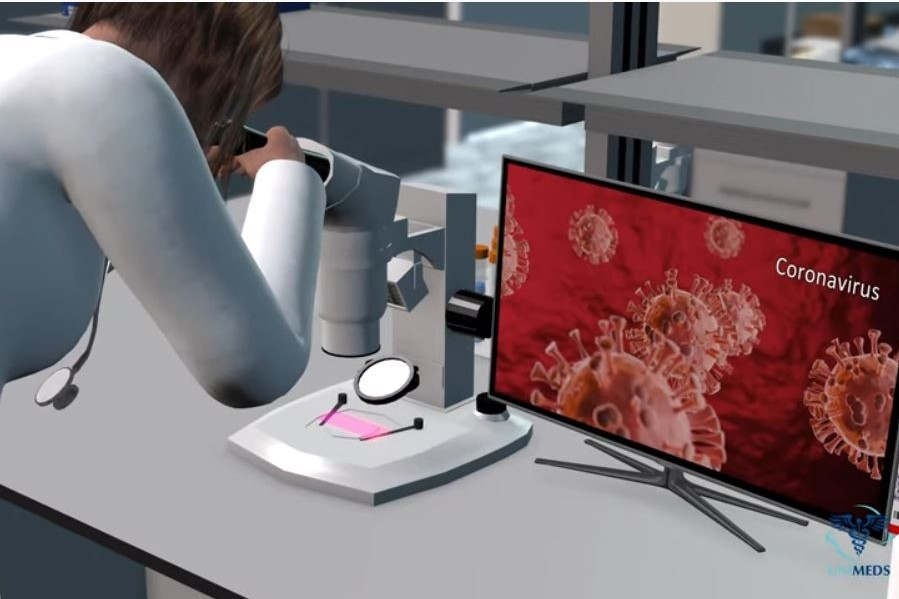A year and a half after the outbreak of Covid-19, mass vaccination of populations is intended as a response to the pandemic. Many scientists are opposed to this vaccination strategy. What do we really know about vaccines? Are they safe for adults and children? Dr. Jean-Marc Sabatier* provides an update.

Four vaccines are licensed in France: Pfizer-BioNTech, Moderna, AstraZeneca and Johnson § Johnson. The first two are messenger RNA, the other two are adenovirus. What exactly are they?
The mRNA vaccines consist of messenger RNA protected within lipid nanoparticle droplets. These messenger RNAs code for the modified S protein (called Spike) of the SARS-CoV-2 virus. This S protein produced by the cell will serve to stimulate the host’s (the vaccine recipient’s) immune system to recognize and neutralize the virus in the event of a subsequent infection with SARS-CoV-2.
AstraZeneca and Johnson & Johnson’s viral vector vaccines use modified viruses (also called recombinant viruses). These viruses are modified to be attenuated and to code for the SARS-CoV-2 S protein. The AstraZeneca vaccine uses a chimpanzee adenovirus; the Johnson & Johnson vaccine uses a human adenovirus.
mRNA vaccines are the most widely used in France. What do we really know about these vaccines? Do they really and definitively protect against Covid-19 and SARS-CoV-2 variants, notably the (Indian) Delta variant?
The messenger RNA vaccines give overall very high protection rates, close to 95%. They appear to be effective against SARS-CoV-2, but their effectiveness may vary according to the variants of the virus. The efficacy is therefore different according to the variants. For example, it is maximal for the initial strain (Alpha) of the 1st wave, and appears minimal for the (Californian) Epsilon variant.
Currently, the Delta variant is spreading in France. This variant shows a faster replication (multiplication) and a higher viral load (about 1260 times) than the initial virus (Alpha). Although it replicates much faster, the Delta variant appears to be ten times less lethal than the first wave virus (0.2% lethality for the Delta variant compared to 1.9% lethality for the initial Alpha strain).
What do we know about their side effects?
These different vaccines share common side effects that, in some (fortunately rare) cases, can be serious. The major deleterious effects appear to be based on the vaccine protein S, which appears to bind to the target of SARS-CoV-2, the ACE2 (angiotensin converting enzyme 2) receptor.
Although minor (and transient) side effects may be associated with some of the compounds/adjuvants in the vaccine composition, the major effects are based on the production of a protein S, which is itself deleterious. In fact, it appears that protein S alone (in its trimeric form) is capable of binding to the SARS-CoV-2 receptor site and triggering a physiological response comparable to that of the whole virus.
Should children also be vaccinated?
At this time, it seems unreasonable to vaccinate children because children have a very low susceptibility to SARS-CoV-2 and its variants, unlike adults. Moreover, infections of children with SARS-CoV-2 (and variants) almost never lead to very severe forms of Covid-19. The lethality in children at this stage is almost zero. Moreover, as vaccination does not block the potential transmission of the virus, it does not appear useful in children. I would add that we do not have enough experience with these vaccines (especially for mRNA vaccines), and that the benefit/risk ratio is clearly not in favor of vaccinating younger people.
Is mass vaccination in the midst of a pandemic a good health strategy?
The urgency of mass vaccination to stop the spread of SARS-CoV-2 is understandable. But this massive vaccination, in the middle of a pandemic, has the disadvantage of also leading to the emergence of variants of the virus that may be more or less infectious, and more or less lethal.
Jean-Michel Claverie, virologist, president of the French Society of Virology and specialist in genomics, university professor and hospital practitioner emeritus, former director of the Institute of Microbiology of the Mediterranean (CNRS, University of Aix-Marseille) speaks of a “state lie” on BFMTV about the fourth wave of the epidemic due to the Delta variant in France. Should we believe him?
It seems that the lie he is referring to is the warning about a fourth “devastating” wave in France based on the Delta variant, requiring accelerated vaccination and the most complete possible vaccination coverage of the population. Indeed, the infectious power of the Delta variant is superior to the initial Alpha strain because it replicates (and spreads) faster and the associated viral load is about 1260 times higher than that of the Alpha strain. Nevertheless, the Delta variant appears to be much less dangerous with a 3-log (1000-fold) reduction in mortality compared to the Alpha strain. It causes less severe and lethal forms of Covid-19. Apparently this virus remains preferentially localized in the upper airways, which makes it a SARS-CoV-2 virus of lesser danger and lethality.
To conclude, I would say that it is very likely that we will evolve in the future towards more contagious variants of SARS-Cov-2, but less dangerous and lethal, like the Delta variant.
*Jean-Marc Sabatier, PhD in Cellular Biology and Microbiology, research director at the CNRS, affiliated to the Institute of Neuro-Physio-pathology (INP) of the University of Aix-Marseille

